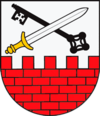Ludza
|
Ludza Lucyn |
||
|---|---|---|
| Town | ||

Ludza skyline
|
||
|
||
| Location in Latvia | ||
| Coordinates: 56°33′N 27°43′E / 56.550°N 27.717°ECoordinates: 56°33′N 27°43′E / 56.550°N 27.717°E | ||
| Country |
|
|
| Town rights | 1777 | |
| Government | ||
| • Mayor | Alīna Gendele | |
| Population (20119) | ||
| • Total | 8,931 | |
| Time zone | EET (UTC+2) | |
| • Summer (DST) | EEST (UTC+3) | |
| Postal code | LV-570(1-2) | |
| Calling code | +371 657 | |
| Number of Municipality council members | 15 | |
Ludza (![]() pronunciation ; Polish: Lucyn) is a town in the Latgalia region of eastern Latvia. It is located on the main Riga - Moscow road, part of European route E22, and only 30 km from the Latvian-Russian border. The population as of 2011 was 8,931.
pronunciation ; Polish: Lucyn) is a town in the Latgalia region of eastern Latvia. It is located on the main Riga - Moscow road, part of European route E22, and only 30 km from the Latvian-Russian border. The population as of 2011 was 8,931.
Ludza, the oldest town in Latvia, was first mentioned in Russian chronicles dating to 1173 or 1177. In 1399 the Livonian Order built a stone fortress atop an older Latgalian fortress and used Ludza as an eastern outpost in Livonia. Ludza Castle ruins can be visited nowadays. After the dissolution of the Livonian Order in 1561, Ludza was incorporated to the Polish–Lithuanian Commonwealth and became part of Wenden Voivodeship. After the first partition of Poland in 1772 was taken over by the Russian Empire and added to Vitebsk Governorate. Ludza received town rights in 1777 from Catherine II of Russia. The Jewish population was important in the town. On July 1941, the Germans occupied the town and kept the Jews prisoners in a ghetto. From July 1941 until the spring of 1942, hundreds of Jews are murdered in mass executions perpetrated by Einsatzgruppen.
...
Wikipedia


